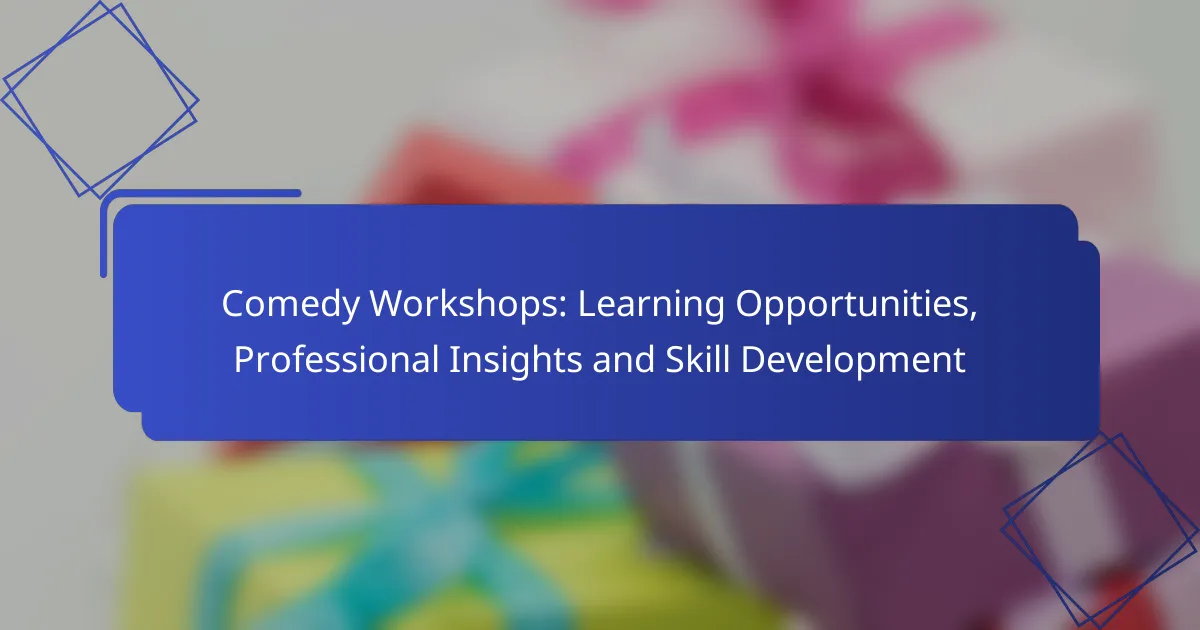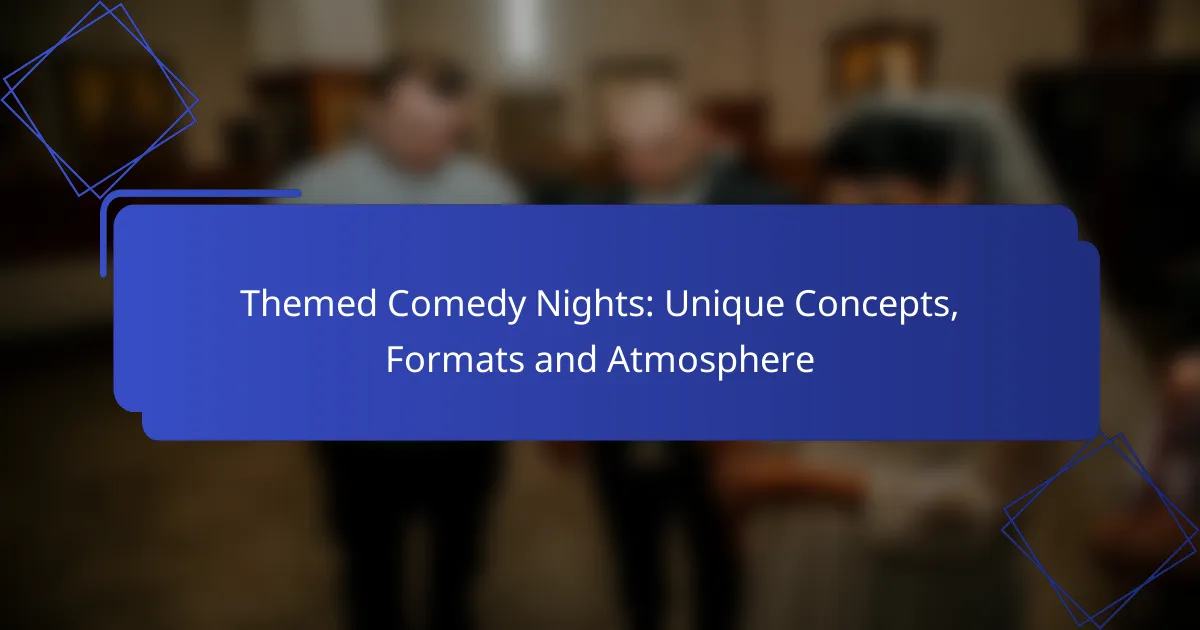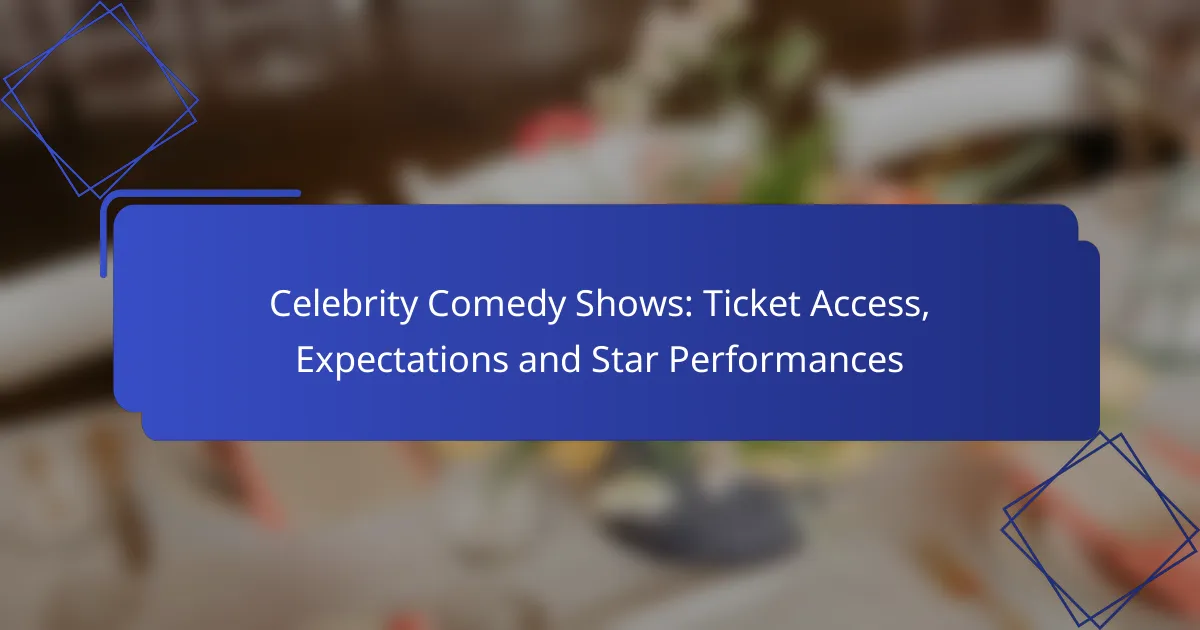Comedy workshops in the United States offer aspiring comedians a unique opportunity to enhance their skills through structured learning and practical exercises. Catering to various skill levels and comedic styles, these workshops provide valuable professional insights in a supportive environment, helping participants refine their techniques and build confidence. Whether you’re a beginner or looking to hone your craft, these workshops are designed to foster creativity and growth in comedic performance.
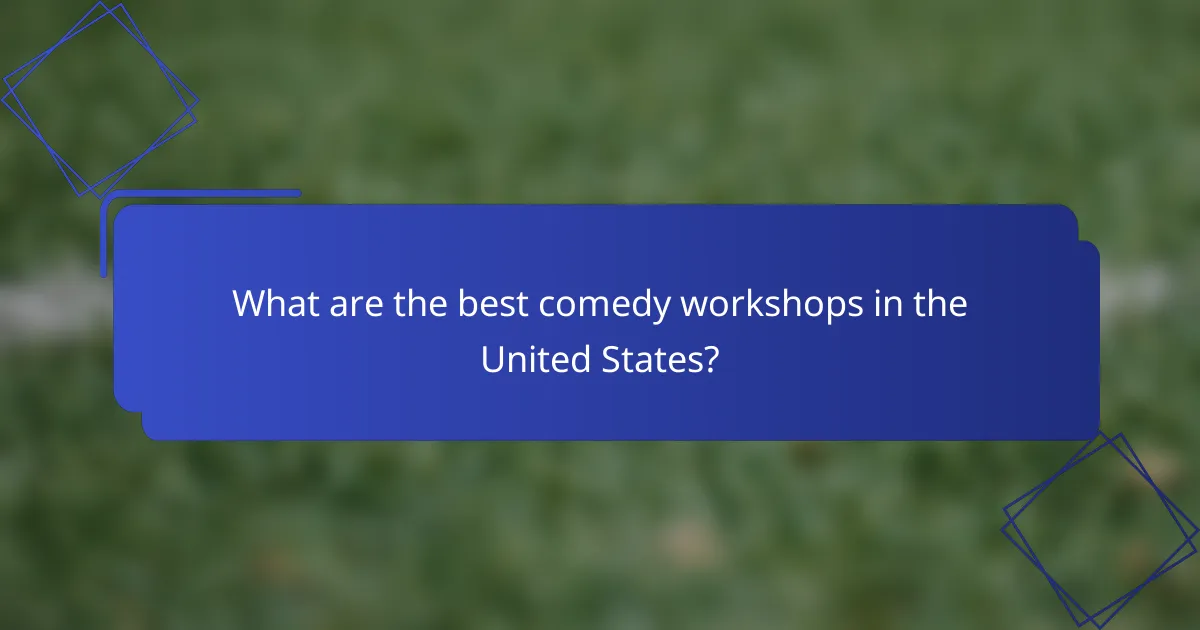
What are the best comedy workshops in the United States?
The best comedy workshops in the United States offer a range of classes that cater to different skill levels and comedic styles. These workshops provide aspiring comedians with practical training, professional insights, and opportunities for skill development in a supportive environment.
Upright Citizens Brigade Theatre workshops
Upright Citizens Brigade Theatre (UCB) is renowned for its improv and sketch comedy training. Their workshops focus on developing skills in improvisation, writing, and performance, catering to both beginners and experienced comedians. Classes are typically held in major cities like New York and Los Angeles, offering a range of levels from beginner to advanced.
Participants can expect to engage in exercises that enhance their creativity, timing, and stage presence. UCB emphasizes the importance of collaboration and encourages students to perform in showcases, providing real-world experience.
The Second City training programs
The Second City is one of the most prestigious comedy institutions in the U.S., known for its alumni who have gone on to successful careers in television and film. Their training programs include improv, sketch writing, and acting, with classes available in cities such as Chicago and Toronto.
Students learn through a mix of theory and practical application, often culminating in performances that allow them to showcase their skills. The Second City also offers specialized workshops that focus on specific aspects of comedy, such as character development and comedic timing.
Groundlings School classes
The Groundlings School in Los Angeles is famous for its unique approach to improv and character-driven comedy. Their classes are designed to help students develop strong characters and improve their improvisational skills through a series of progressive levels.
Groundlings classes emphasize the importance of storytelling and character work, with students frequently participating in performances that highlight their growth. The school has a reputation for producing successful comedians who have made significant contributions to the comedy landscape.
ComedySportz workshops
ComedySportz offers workshops that focus on improv comedy in a fun and interactive environment. Known for their competitive improv format, these workshops are suitable for all skill levels and emphasize teamwork and creativity.
Classes often include games and exercises that build confidence and quick thinking. ComedySportz also provides opportunities for students to perform in front of live audiences, which is invaluable for developing stage presence and audience engagement skills.

How can comedy workshops improve my skills?
Comedy workshops can significantly enhance your skills by providing structured learning environments that focus on key aspects of comedic performance. Participants engage in practical exercises that foster creativity, refine techniques, and build confidence in their comedic abilities.
Enhance improvisation abilities
Improvisation is a vital skill in comedy, allowing performers to think on their feet and react spontaneously. Workshops often include games and exercises designed to boost quick thinking and adaptability, helping you become more comfortable with unexpected situations.
For example, participating in “yes, and” exercises encourages collaboration and builds a supportive atmosphere, which is essential for honing improvisational skills. Regular practice in these settings can lead to a noticeable improvement in your ability to create humor spontaneously.
Develop writing techniques
Comedy workshops focus on various writing techniques that can elevate your comedic material. Participants learn the fundamentals of joke structure, timing, and punchlines, which are crucial for crafting effective comedic content.
Workshops may include peer reviews and feedback sessions, allowing you to refine your writing based on constructive criticism. Engaging in regular writing prompts can also help you generate new ideas and develop a unique comedic voice.
Boost performance confidence
Confidence is key in comedy, and workshops provide a safe space to practice and perform in front of an audience. Through repeated exposure to live performance, you can learn to manage stage fright and improve your delivery.
Participating in mock performances and receiving feedback from instructors and peers can significantly enhance your self-assurance. Setting small, achievable goals during these workshops can also help build your confidence over time, making you more comfortable on stage.

What are the prerequisites for attending a comedy workshop?
Prerequisites for attending a comedy workshop typically include no prior experience, potential age restrictions, and a commitment to practice. These factors can vary by workshop, so it’s essential to check specific requirements before enrolling.
No prior experience required
Most comedy workshops welcome participants with no previous experience in comedy. This inclusivity allows beginners to explore their comedic potential without feeling intimidated. Workshops often focus on fundamental skills such as joke writing, improvisation, and stage presence.
For those new to comedy, starting with a beginner-friendly workshop can provide a solid foundation. Look for classes that emphasize a supportive environment where participants can learn and grow at their own pace.
Age restrictions may apply
Some comedy workshops may have age restrictions, especially if they involve adult themes or language. Typically, workshops aimed at adults may require participants to be at least 18 years old. However, many workshops cater to younger audiences, offering age-appropriate content.
When considering a workshop, check the age requirements listed by the organizer. This ensures that the material and environment are suitable for your age group, enhancing the overall learning experience.
Commitment to practice
Attending a comedy workshop often requires a commitment to practice outside of class. Regular practice helps reinforce skills learned during sessions and builds confidence in performance. Participants should be prepared to write jokes, perform in front of peers, and engage in improvisational exercises.
To maximize the benefits of a workshop, set aside time each week for practice. This could involve writing new material, rehearsing performances, or attending open mic nights to gain real-world experience. Consistent effort will significantly enhance your comedic abilities.

What is the typical structure of a comedy workshop?
A comedy workshop typically combines various instructional methods to help participants develop their comedic skills. These workshops often include classroom instruction, group exercises, and opportunities for live performances, providing a well-rounded approach to learning comedy.
Classroom instruction and theory
Classroom instruction in a comedy workshop focuses on the fundamentals of humor, including timing, delivery, and joke structure. Participants learn about different comedic styles and techniques, often through lectures and discussions that encourage critical thinking about comedy.
Instructors may use examples from famous comedians to illustrate key concepts, helping students understand what makes certain jokes effective. This theoretical foundation is crucial for developing a personal comedic voice.
Group exercises and improvisation
Group exercises and improvisation are essential components of comedy workshops, fostering collaboration and creativity among participants. These activities often involve games and scenarios that encourage quick thinking and spontaneity, helping students build confidence in their comedic abilities.
Improvisation exercises can range from simple word associations to complex scene work, allowing participants to practice their skills in a supportive environment. This hands-on approach helps solidify the concepts learned in the classroom.
Live performance opportunities
Live performance opportunities are a critical aspect of comedy workshops, giving participants a chance to showcase their material in front of an audience. These performances can take place in various settings, from small open mics to larger showcases, depending on the workshop’s structure.
Performing live helps students gain valuable experience and receive feedback from both peers and instructors. This real-world practice is vital for honing their craft and preparing for a career in comedy.
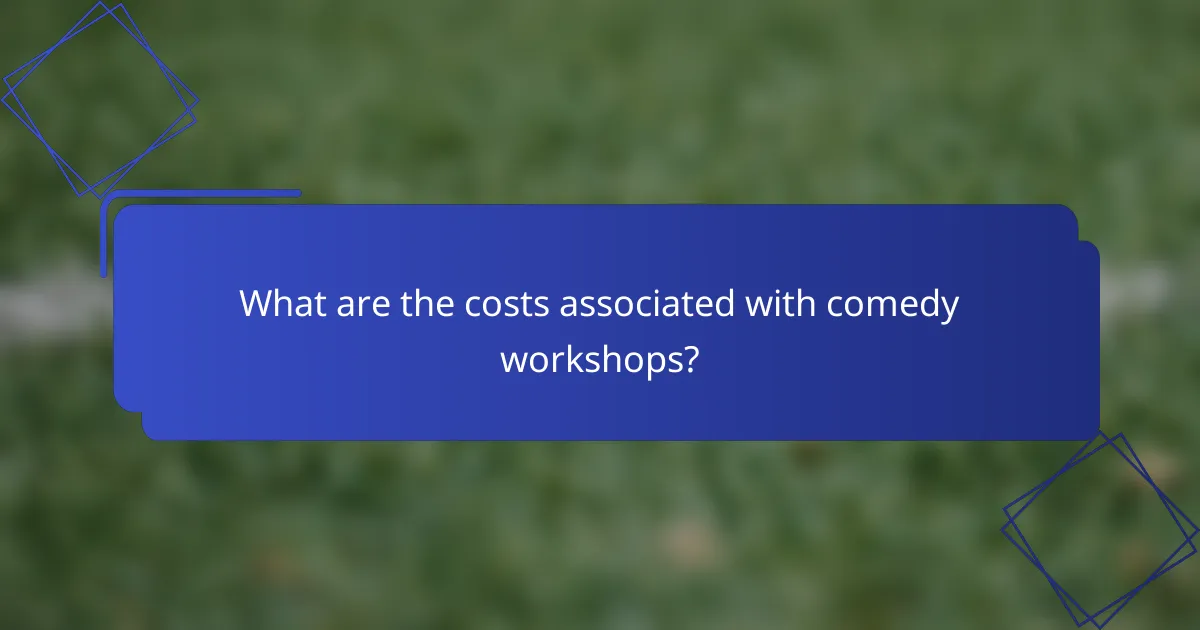
What are the costs associated with comedy workshops?
The costs associated with comedy workshops can vary significantly based on the institution, location, and duration of the program. Generally, participants should expect to pay tuition fees, along with potential additional costs for materials and supplies.
Tuition fees vary by institution
Tuition fees for comedy workshops can range from a few hundred to several thousand dollars, depending on the prestige and length of the program. For instance, community colleges may offer workshops for around $200 to $500, while established comedy schools might charge between $1,000 and $3,000 for comprehensive courses.
It’s essential to research various institutions to find a program that fits your budget and learning goals. Some workshops may offer payment plans or discounts for early registration, which can help manage costs.
Additional costs for materials
In addition to tuition, participants should budget for materials such as books, scripts, and performance gear. These costs can range from $50 to $200, depending on the resources required for the workshop.
Some workshops may include materials in their tuition fees, while others may require students to purchase them separately. Always check the program details to understand what is included and what you need to buy.
Scholarships may be available
Many comedy workshops offer scholarships or financial aid options to help offset costs. These can be based on merit, need, or specific criteria set by the institution.
Prospective students should inquire about available scholarships during the application process. Applying early and providing necessary documentation can increase the chances of receiving financial assistance.
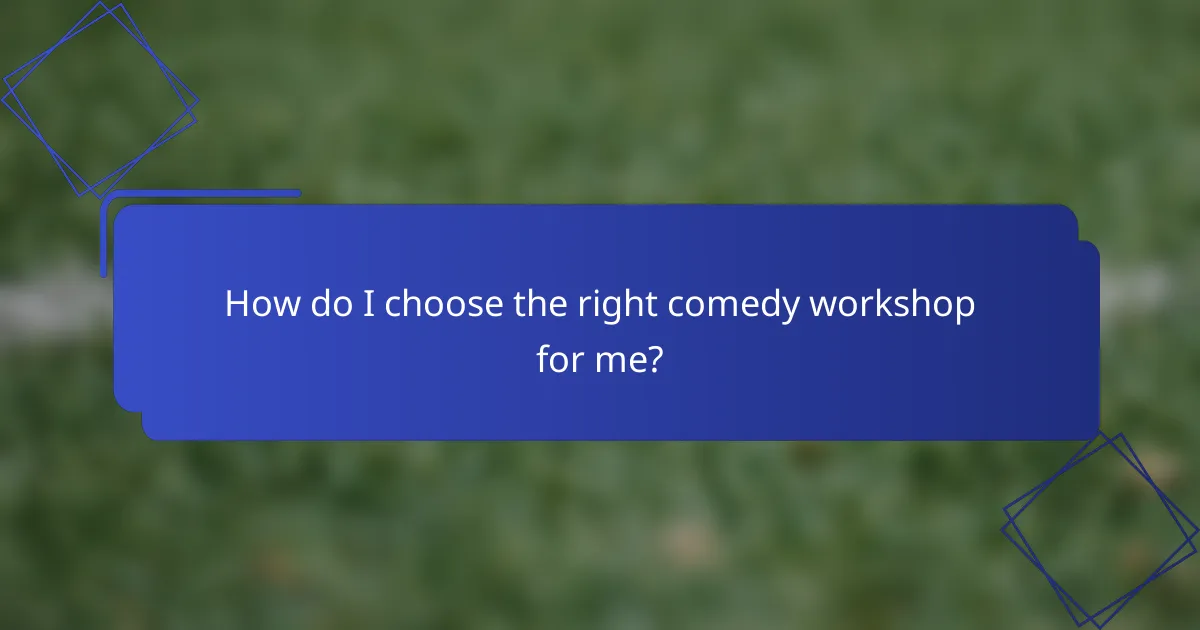
How do I choose the right comedy workshop for me?
Choosing the right comedy workshop involves assessing your goals, experience level, and the workshop’s focus. Consider factors such as the instructor’s background, the format of the sessions, and the type of comedy you want to explore.
Consider your goals
Your goals will significantly influence your choice of a comedy workshop. Are you looking to improve your stand-up skills, learn sketch writing, or explore improv? Clearly defining your objectives will help you select a workshop that aligns with your aspirations.
Evaluate the instructor’s experience
The instructor’s background is crucial in determining the quality of the workshop. Research their experience in the comedy industry, including their performance history and teaching credentials. A seasoned comedian with a successful track record can provide valuable insights and mentorship.
Check the workshop format
Workshops can vary in format, from in-person classes to online sessions. Consider what works best for you—some people thrive in a live environment, while others prefer the flexibility of virtual learning. Additionally, look for workshops that offer a mix of instruction and performance opportunities.
Look for reviews and testimonials
Assess the cost and duration
Comedy workshops can range in price, often from low tens to a few hundred dollars, depending on the length and prestige. Consider your budget and the duration of the workshop, as some may last a few hours while others span several weeks. Ensure you feel the investment aligns with your goals.
